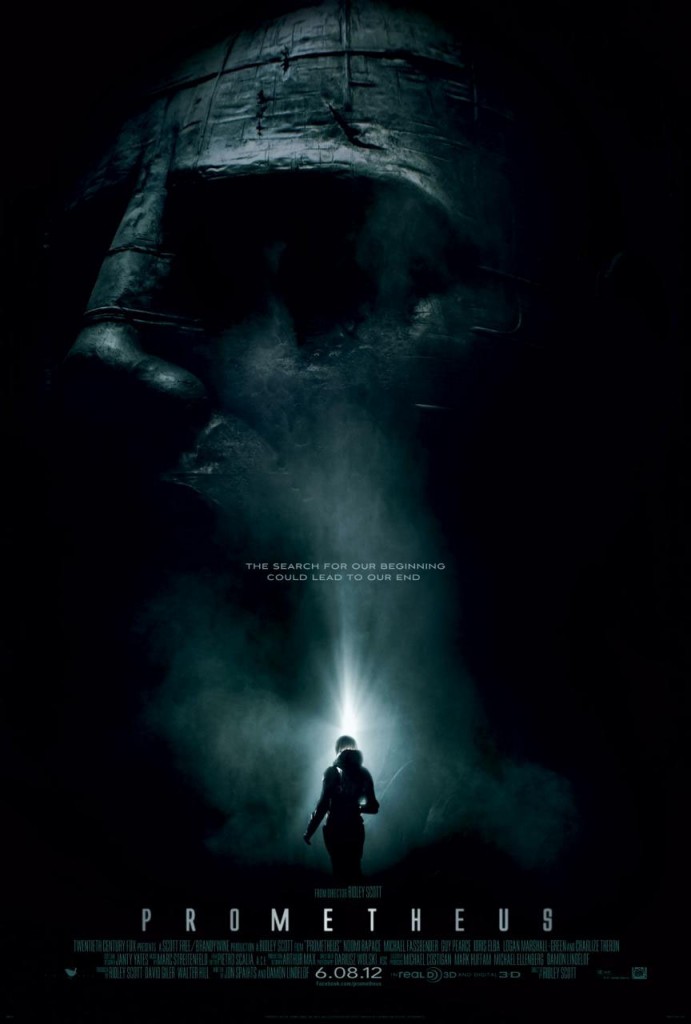Prometheus Gave Us Fire. Ridley Scott’s Film Gave Us Hype, Disappointment And All The Wrong Messages!
Socrates / Op Ed
Posted on: June 25, 2012 / Last Modified: June 25, 2012
 Prometheus is the most over-hyped and under-delivering film I have seen in a long while.
Prometheus is the most over-hyped and under-delivering film I have seen in a long while.
Worse: It sends out all the wrong messages!
There I said it. I am also not afraid to repeat it, even if the movie ends up as a total blockbuster success. (God forbid they make a sequel.)
Wait a minute, you might say: Didn’t you just hit your head? How do we know this is not some kind of side effect?
Why, yes – I did. I had a grade 3 concussion about a week ago, but bear with me for a few minutes and see if I got damaged or if I make any sense.
Let me start with the good stuff:
The PR behind the film was successful in creating both awareness and high interest (hype?!) starting a year before the movie release. The film had unique trailers – e.g. Peter Weyland’s 2023 TED Talk, cleverly designed to stir the pot and go viral from the get go. The clips were released strategically not only to keep public interest high but to also culminate into feverish ticket sales right on time for the premiere.
So far so good. Then, throw in a great cast of actors, a legendary director such as Ridley Scott and a few hundred million dollars to make it happen, and you clearly have the recipe for success. No wonder most of us – me including, went for the hype.
So, what happened?! I really don’t know where or how things went wrong: Either I hit my head too hard or the above elements, though necessary, are not sufficient to make a good film.
If one thing is sure, it must be that Prometheus did give us hype.
“OK, fine!” you might concede. “But what about the ‘disappointment’ and ‘all the wrong messages’ claim?”
Well, take the first one – disappointment. Hyping a product is fine for as long as it delivers on its promise and fulfils the expectations. Failing to do so inevitably leads to disappointment.
“Give me a break, Soc!” you might retort. “Alien is a series of sci-fi horror flicks – not exactly the most profound films ever made. What did you expect?!”
Perhaps. But Prometheus could have been different. In fact, in my opinion this film was notably marketed as being different. So, if after watching it, I conclude it fails to live up to the expectations – both as a horror flick as well as the profound film I was promised, then, I am naturally disappointed:
What a waste of talent, time and money.
But it gets worse. It is not simply a waste. With so many messed up messages a blockbuster can do real damage.
“What are you talking about?” you may ask. “What is your problem?”
Well, one of my problems is that there are so many issues with Prometheus that I can write a book. However, since most of them might not be worth our time, let me give you the shallow quick run through of some of the bigger ones and what they add up to.

Let’s begin with the film poster itself. The text in the middle reads:
“The search for our beginning could lead to our end”
Sure it can. There is no reward if there is no risk. Every pioneer risks almost everything. But what is the alternative?!
Staying put and searching for nothing takes us where?! Exactly:
Nowhere!
We’d still be in the caves.
“But this is just a minor message on the poster Soc. It is not the film itself.” you might reply.
Sure. OK. Let’s give Ridley the benefit of the doubt. Moving beyond the poster, I will claim that the film itself is dripping with what I call “all the wrong messages”: an unimaginative, intellectually small concoction of poorly-articulated anti-scientific technophobia, misguided Christian symbolism and twisted Greek mythology.
Take the opening scene, for example:
An alien humanoid being with God-like physique, on a water planet similar to ours, committing suicide in order to spark life.
So, what is the message here?!
You have to sacrifice yourself, even die, in order to give birth to new life.
That’s not too bad on its own but when you connect it with all the consequent messages it adds up pretty bad.
Imagine this super-advanced race of aliens spreading life across the galaxy, if not the universe. Would they be sacrificing one of their own on every planet that seems fit for life? Couldn’t they come up with a better way to pour some DNA molecules into the primordial soup? Why do you have to die to create? Why not live to see your children grow up?
It doesn’t make any sense. Unless, of course, your “aliens” have a fetish for our very human Judeo-Christian death-favouritism. Otherwise, why would they kill themselves?!
Moving on. Why is the powerful Peter Weyland so abhorrently deformed?! By the end of the 21st century a trillionaire like him should have no problem bettering the facelifts of today. Plus, if my math is right Peter is in his late 90’s – not that old to look much better at any time, let alone at the end of the 21st century.
My explanation is this: at face value, the purpose of the mission is to make contact with humanity’s creators – “the engineers,” for the edification of our species. But the real goal is to assist Peter Weyland in his quest to defeat death. Because he is a misguided human vainly seeking immortality.
“A king has his reign. He dies. It’s the natural order of things.” Weyland’s daughter, Meredith Vickers says. Clearly, her father goes against what’s natural.
Selfish and vain human – looks bad on the outside and bad on the inside.
Contrast that to the God-like Olympian physique of our alien creators. They do seem to be ageless, able to travel across the universe and are eager to commit noble suicide the moment they reach a water planet.
Selfless and life-giving alien engineer – good, both in and out.
Moving on. Why would the good engineers create us only to end up wanting to kill us?
Well, there is no clear answer but we are given clues that they changed their mind about 2,000 years ago. So, what was the major event around that time?
Clearly, it was Jesus. If Jesus was himself an engineer this would be the second time an alien dies for us. I guess two times is enough for our creators to change their mind for we are clearly beyond salvation. So after we killed Jesus they decide to kill us. However, while stockpiling their bio-weapons on a remote planet something goes wrong. And there we are: two millennia later humanity’s arrogant search for answers and/or immortality threatens to finish the job the aliens started.
In the process, Prometheus presents an intellectually small vision with no depth, gaping holes in the plot, an unimaginative under-predicted vision of the future while failing to explore numerous opportunities to at least touch on the complex intricacies of immortality, artificial intelligence, SETI, science, technology or philosophy.

If there is a single shining light in the movie it must be Michael Fassbender’s portrayal of David 8: an android with “no soul” but a clear liking for Peter O’Toole’s Lawrence of Arabia.
It is David who steals the “black goo” from the alien ship and gives it to the scientist, after hearing the human say that he is willing to risk everything in his arrogant quest for answers. Though his intentions are somewhat difficult to discern, the robot is ostensibly giving the humans what they want – a divine transformative experience.
In his turn David also gets what he wants i.e. “to see his parents dead.”
Unfortunately, in the process an engineer with clear contempt for robots with “no soul” – our impotent attempt to be God-like engineers in our own right, rips off his head. Paradoxically, David’s creators have made him durable enough to survive decapitation.
A few weeks ago I watched a BBC interview with Ridley Scott where he shared that he is of the “it’s all about everything” school. Sadly, it seems to me that his meaning of “everything” doesn’t seem to include a good story, a solid and coherent script, proper scientific research and intelligent dialogue that challenges the audience to reach up, rather than come down.
Prometheus gave us fire. I have not doubt that if he could have made us Gods and given us immortality he would have. (Legend has it that his children went to live among the humans thereby breeding divinity among us and making us demi-Gods…)
Prometheus was punished by the Gods. Frankenstein got killed by his monstrous creature. Ridley Scott warns us that “The search for our beginning could lead to our end.” Some may take the film as a cautionary tale but to me it seems a lot more conclusive: a definitive proclamation! And I don’t like the main anti-technology, anti-science, anti-pushing the envelope and breaking through all barriers kind of message, even if admittedly we may be playing with fire.
Icarus may have died trying but we didn’t give up flying. And today we soar higher than we ever thought possible. Darned be those who want to ground us, whether deliberately or not, with their cautionary tales about chasing the impossible dream. As Muhammad Ali said once:
“Impossible is just a big word thrown around by small men who find it easier to live in the world they’ve been given than to explore the power they have to change it. Impossible is not a fact. It’s an opinion. Impossible is not a declaration. It’s a dare. Impossible is potential. Impossible is temporary. Impossible is nothing.”
Yes, we have managed to create a myriad of problems for ourselves. But the mere fact that we are still here is a testament that we can and have produced a myriad of solutions too. So for me the answer is not going back. It is not less curiosity, science or technology. It is more. It is going intelligently forward with better and smarter technology.
And more of it.
Prometheus never regretted giving us fire and didn’t mind paying the price for his bold act of defiance. Ridley Scott’s alien engineers clearly regretted giving us life. I myself almost regret wasting time and money on this movie but now you know what I mean by saying:
Prometheus Gave Us Fire. Ridley Scott’s Film Gave Us Hype, Disappointment And All The Wrong Messages!
Related articles
- Prometheus: An Archaeological Perspective (sort of). (DigitalDiging.net)
- 5 Scientists Share Their Baffled Reactions on the Science in ‘Prometheus’ (Forbes.com)









